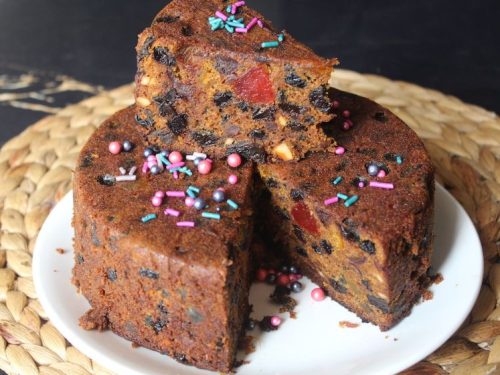When the holiday season approaches, the aroma of freshly baked plum cakes wafting through kitchens and bakeries signals the arrival of joyous celebrations. With their rich flavors, dense texture, and deep cultural significance, plum cakes online have become synonymous with festive indulgence. Let’s explore why these delightful cakes hold such a cherished spot in the hearts of dessert lovers during the holidays.
1. A Tradition Steeped in History
Plum cakes have a long history dating back to medieval England, where they began as plum porridge. Over time, dried fruits, nuts, and spices were added to the recipe, eventually transforming it into the beloved plum cake we know today. This dessert’s association with Christmas and New Year’s Eve has made it a staple in festive traditions worldwide.
2. A Symphony of Flavors
The beauty of a plum cake lies in its medley of flavors. Ingredients such as dried fruits (raisins, currants, and prunes), nuts, and aromatic spices like cinnamon and nutmeg come together to create a flavor profile that’s warm, comforting, and celebratory. Often soaked in rum or brandy, the fruits lend the cake a distinct richness that’s hard to resist.
3. Perfect for Sharing and Gifting
Plum cakes are the ultimate symbol of togetherness. They are perfect for family gatherings, festive parties, and even as thoughtful gifts. The effort put into baking or selecting a high-quality plum cake reflects care and love, making it a cherished gesture during the holiday season.
4. Adaptability to Modern Tastes
While traditional plum cakes hold a timeless charm, modern variations cater to diverse tastes and dietary preferences. From eggless and vegan versions to gluten-free options, there’s a plum cake for everyone. These adaptations ensure that the festive spirit can be enjoyed by all, regardless of dietary restrictions.
5. A Global Favorite
Plum cakes have transcended borders, becoming a festive favorite in many countries. In India, for instance, the preparation of plum cakes often begins weeks in advance, with families soaking fruits in spirits to enhance their flavor. This practice has turned the humble plum cake into a centerpiece of Christmas celebrations.
6. The Warmth of Homemade Baking
The process of baking a plum cake is as delightful as the cake itself. It brings families together in the kitchen, creating memories filled with laughter, love, and the anticipation of savoring the final product. The ritual of mixing, baking, and decorating the cake is an integral part of the holiday experience.
Conclusion
Plum cakes are more than just desserts; they are a celebration of tradition, community, and the joy of giving. Their rich flavors, versatility, and historical significance make them the heart of festive desserts. As the holiday season approaches, indulge in the timeless charm of a plum cake and create sweet memories that will last a lifetime.
Benefits of Plum Cakes
- Rich Nutritional Value: Plum cakes are packed with dried fruits and nuts, which are excellent sources of vitamins, minerals, and healthy fats. These ingredients provide energy and nutrition during the festive season.
- Long Shelf Life: Thanks to the alcohol-soaked fruits and the dense texture, plum cakes have a longer shelf life compared to many other desserts, making them perfect for gifting and enjoying over an extended period.
- Versatility: Plum cakes cater to a variety of tastes and dietary preferences, with options like eggless, vegan, and gluten-free versions available for different needs.
- Symbol of Celebration: The preparation and sharing of plum cakes enhance the festive spirit, making them a centerpiece for gatherings and joyous occasions.
- Digestive Benefits: Spices like cinnamon and nutmeg used in plum cakes are known to aid digestion, making them a comforting dessert after heavy festive meals.
FAQs About Plum Cakes
1. Why is it called a plum cake when there are no plums in it?
Historically, the term “plum” referred to dried fruits such as raisins and currants. While modern plum cakes may not contain fresh plums, they are loaded with a variety of dried fruits.
2. Can I make a plum cake without alcohol?
Yes, you can substitute alcohol with fruit juices like orange or apple juice to soak the dried fruits. This version is just as flavorful and suitable for all age groups.
3. How long does a plum cake last?
A well-prepared plum cake can last for several weeks if stored properly in an airtight container. The alcohol acts as a natural preservative, further extending its shelf life.
4. Are there gluten-free plum cake options available?
Absolutely! Many bakeries and recipes now offer gluten-free versions using alternative flours like almond or rice flour.
5. What is the best time to start preparing a plum cake?
The fruits for traditional plum cakes are often soaked weeks or even months in advance to enhance their flavor. However, the cake itself can be baked closer to the festive season.
6. Can I freeze a plum cake?
Yes, plum cakes freeze well. Wrap the cake tightly in plastic wrap and store it in an airtight container. Thaw it at room temperature before serving.
7. What are the key ingredients in a plum cake?
Dried fruits, nuts, spices (like cinnamon and nutmeg), flour, eggs (or substitutes), butter, sugar, and sometimes alcohol or fruit juices are the essential components of a plum cake.
8. Why is plum cake associated with Christmas?
Plum cakes have a historical connection with Christmas traditions, especially in Europe. The rich ingredients and labor-intensive preparation made them a special treat for the holiday season.

